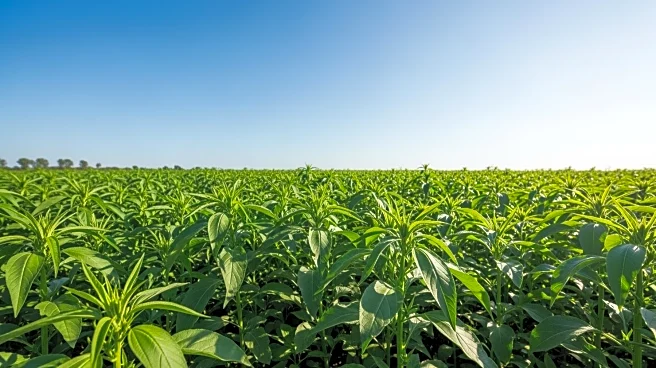What's Happening?
Pakistan is facing a food security crisis exacerbated by rapid population growth, water scarcity, and climate change. The Civil Society Coalition for Climate Change is advocating for the adoption of genetically
modified (GMO) seeds to address these challenges. GMO seeds, developed through modern biotechnology, offer increased resilience to drought, pests, and climate extremes, potentially improving agricultural productivity. Currently, Bt cotton is the only GMO crop permitted in Pakistan, but the coalition argues for extending GMO technology to food crops. Despite concerns about health risks and biodiversity, global scientific consensus supports the safety of GMO foods. The coalition emphasizes the need for improved governance, transparent regulation, and public engagement to facilitate GMO adoption.
Why It's Important?
The adoption of GMO seeds in Pakistan could significantly impact the country's agricultural sector by increasing crop yields and reducing reliance on chemical inputs. This shift could alleviate pressure on water resources and help stabilize food production amid climate change. Furthermore, GMO technology could reduce Pakistan's dependence on food imports, which currently strain foreign exchange reserves and expose the country to global price fluctuations. By improving productivity and reducing input costs, GMO adoption could also enhance rural incomes and lift farmers out of poverty. However, successful implementation requires political leadership, regulatory clarity, and public engagement to address governance challenges and ensure sustainable practices.
What's Next?
For Pakistan to successfully integrate GMO technology into its agricultural policy, a coordinated national strategy is necessary. This includes strengthening biosafety and seed certification systems, investing in local biotech research, and developing public-sector GMO seeds to reduce dependence on multinational companies. Learning from China's approach, Pakistan could combine public investment with tight regulation to scale up GMO adoption while maintaining national control. Additionally, broader agricultural transformation is needed, including improved irrigation, investment in research and development, farmer training, and better market access. Political will and public engagement are crucial to overcoming outdated fears and embracing biotechnology as a necessity for food security.
Beyond the Headlines
The debate over GMO adoption in Pakistan highlights ethical and governance issues related to agricultural innovation. Critics express concerns about potential dependence on multinational companies and the impact on biodiversity. However, these challenges can be mitigated through public-sector initiatives and biodiversity-friendly practices. The broader implications of GMO adoption include shifts in agricultural policy, potential changes in rural economies, and the need for transparent regulatory frameworks. Embracing biotechnology could also influence cultural perceptions of food production and sustainability, prompting discussions on the balance between technological advancement and traditional farming practices.








